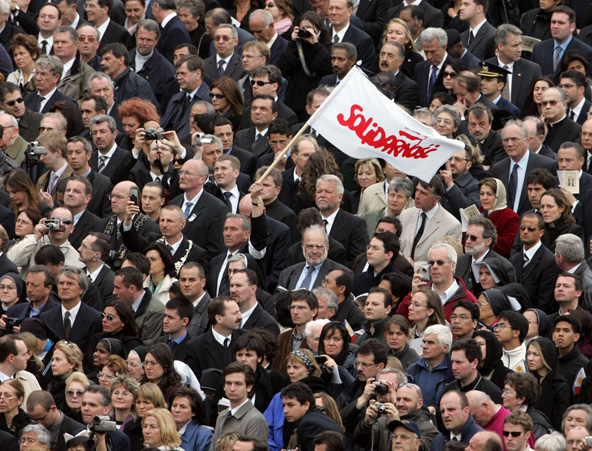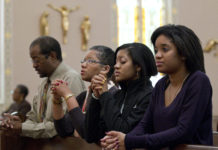
The defense of nascent trade unionism in late-19th-century America is a bright chapter in the history of the Catholic Church in the United States. When a nervous Vatican was prepared to write off trade unions as the kind of “secret societies” the Church had long opposed, Cardinal James Gibbons of Baltimore defended the Knights of Labor in Rome and forestalled a Vatican condemnation of American unions — an accomplishment that helped the Church retain the loyalty of working class people.
Gibbons’s defense of the Knights of Labor may or may not have had much influence on Pope Leo XIII’s endorsement of labor-organizing in the 1891 encyclical, Rerum Novarum, but it set a pattern of Catholic support for trade unionism that continued in the United States for a century. That support seemed vindicated anew when the “independent self-governing trade union” Solidarity played a crucial role in the collapse of European communism in the 1980s.
But times and social realities change. The developing social doctrine of the Church has had to take account of new economic, demographic and fiscal realities — and that process has sometimes required serious rethinking of the Church’s approach to public policy and the positions the Church’s leaders habitually take on specific issues. Similarly, the social doctrine must take account of the changing realities of American trade unionism: one of the most salient of which is that the majority of union members now belong to public-sector workers unions, not unions in the private sector. Most unionized American workers today are government workers.
The very idea of public-sector workers unions was resisted by such stalwart liberals as Franklin D. Roosevelt and AFL-CIO president George Meany. Now that public-sector unions are a large part of the American landscape, some of the theoretical concerns that were debated before government workers became unionized are no longer simply theoretical.
Social scientists typically raise three cautions about the distinctive character of public-sector workers unions: public-sector unions can distort labor markets by politicizing hiring and firing; public-sector unions tend to put serious pressure on public finances (for which weak politicians, seeking electoral support, are at least as much at fault); and public-sector unions tend to diminish the quality of public services (by making it more difficult to apply the “good government” standards American trade unionism once supported).
To which cautions might be added the self-interest of public-sector unions in expanding government (more government = more jobs; more government jobs = more members of AFSCME, NEA and other public sector mega-unions); the resistance of union-organized government workers to change (does any serious student of American elementary and secondary education doubt that the immense and humanly tragic failures of America’s K-12 public schools have something to do with unions’ resistance to performance standards for teachers?); the capacity of public-sector unions and their political allies to hold hostage the normal processes of democracy (see “Wisconsin”); and the ways in which public-sector unions’ demands for ever-higher wages and benefits distort public finance and drain resources from other areas where social justice is at stake.
The right of workers to organize is a settled matter in Catholic social doctrine. But organized labor, like other parts of society, has responsibilities to the common good. No one will begrudge a union the right to defend its own; that’s why it exists. But when unions defend only their own, to the detriment of the rest of society (and, in a prime American case, the detriment of poor, inner-city children), something is wrong.
Solidarity in Poland was a movement of social, cultural, moral and political renewal. It would be hard to say that about the American Federation of State, County and Municipal Employees or the National Education Association, just as it is impossible to draw an analogy between 21st-century AFSCME or NEA members and the union members of the pre-Sixties AFL-CIO (much less the Knights of Labor in their sweatshops). Appeals to the Solidarity experience, or to “tradition,” as a Catholic reason for uncritically endorsing public-sector unions’ demands is not readily squared with either reality or Catholic social doctrine.




![[VIDEO] Make Sunday feel like Sunday again](https://www.catholicsun.org/wp-content/uploads/2021/04/2021-YOUTUBE-BISHOP-MESSAGE-THUMBNAIL-ENGLISH-218x150.png)
